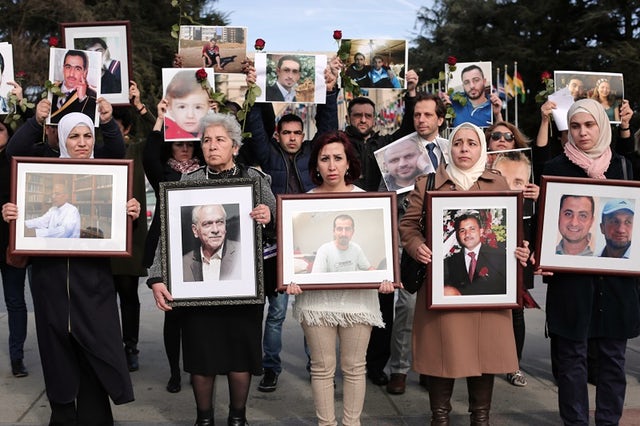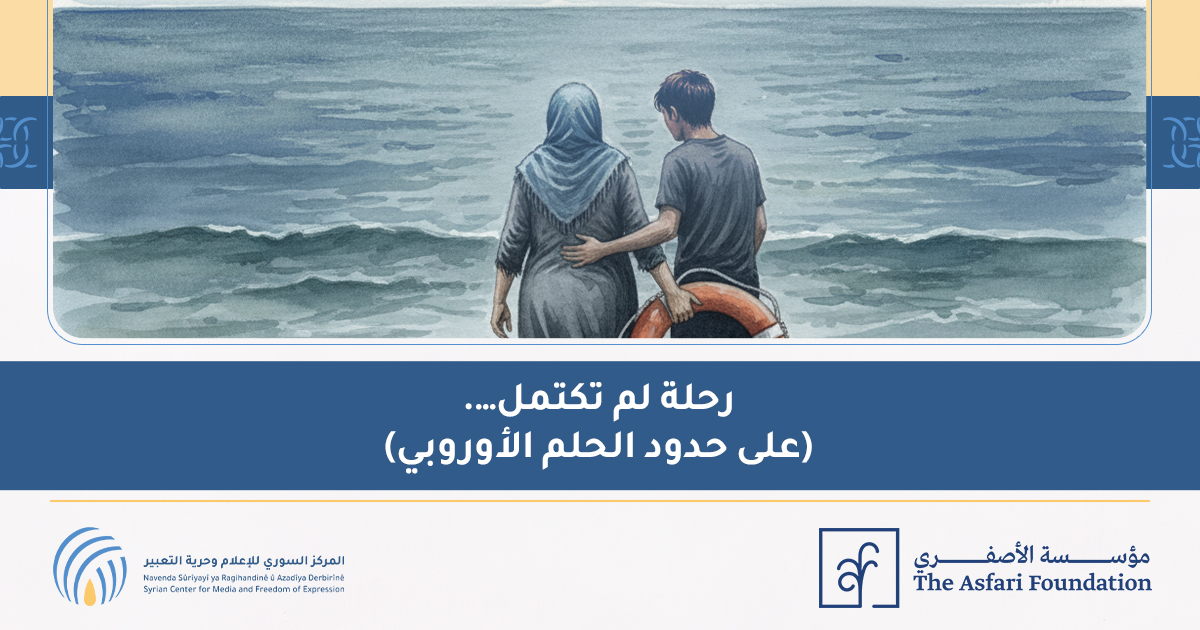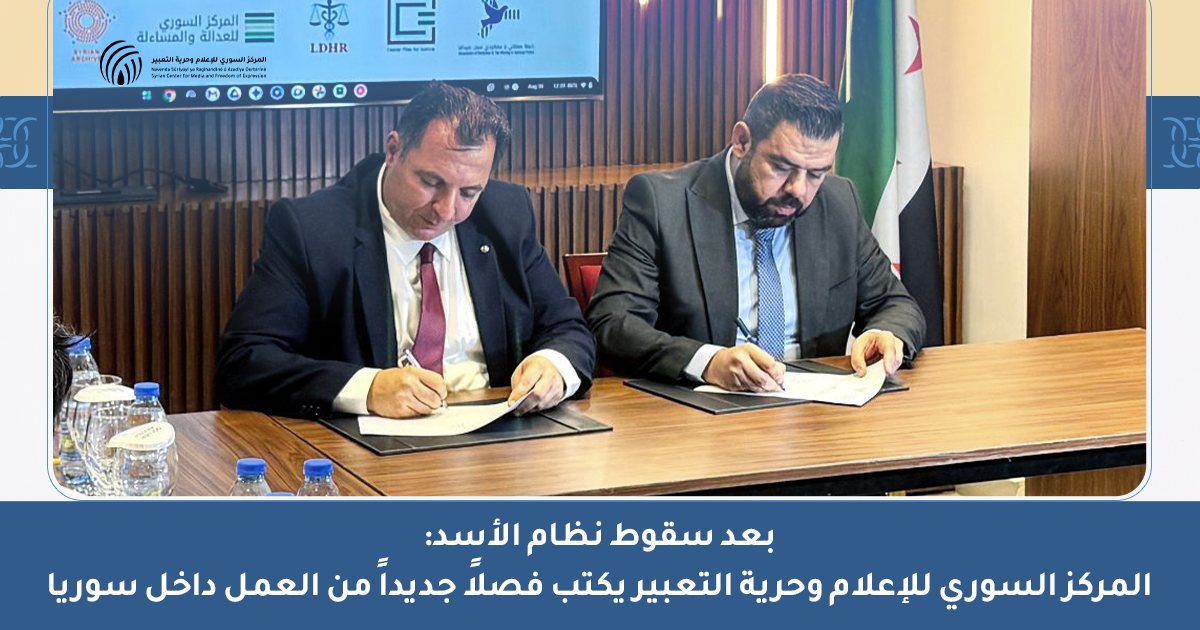Tens of thousands of people remain in detention or have ‘disappeared’ in Syria, devastating countless families. Nevertheless, advocates say the issue has largely been avoided in peace talks and negotiations aimed at bringing an end to the Syrian conflict.
WRITTEN BY: Nicola Cutcher

Members of the Families for Freedom and their supporters carrying photos of their missing loved ones at a demonstration in Geneva in February 2017.Dylan Collins/Families for Freedom
AFTER BEING TORTURED in a Syrian detention center, journalist and human rights activist Mazen Darwish was left for dead.
“When I opened my eyes, I found myself lying among dead bodies. I tried to move and one of the guards saw that I was still alive and dragged me back to my cell. Another officer might have left me there until I died, so it is just chance that I am here today,” he said.
Darwish founded the Syrian Centre for Media and Freedom of Expression in 2004 and worked openly in Damascus despite what Human Rights Watch called the Syrian state’s “repression of human rights activism.” In February 2012, Syrian security forces arrested him and his colleagues at their office. He was released in August 2015, but some of his closest friends and colleagues died in detention and others remain “disappeared.”
Tens of thousands of people are currently missing in Syria, most of them arrested by the regime’s security and intelligence agencies and some taken by armed groups. This issue affects hundreds of thousands of people either directly or indirectly. Most households know someone who is missing, but the full scale of disappearances remains unknown. Syrian president Bashar al-Assad’s government ignores requests to provide information about detainees and many families don’t report their loved ones missing for fear of repercussions.
Survivors, including Darwish, speak of overcrowded cells, starvation, medical neglect, torture and death. Families and friends of the disappeared suffer from not knowing where their loved ones are being held nor whether they’re dead or alive. The U.N. published a report last year accusing the Syrian government of the murder, rape, torture and extermination of detainees.
However, the issue continues to be largely ignored at Syria peace talks. Darwish’s organization and other civil society groups recently wrote an open letter to the United Nations High Commissioner of Human Rights (UNHCR) to protest against “the international community’s negligence and disregard” for those disappeared and detained in Syria.

Marcel Gelauff (right) awards Mazen Darwish the Freedom of Speech and Expression Award on April 21, 2016, in Middelburg, Netherlands. (Michel Porro/Getty Images)
Last year, U.N. Special Envoy for Syria Staffan de Mistura appointed Eva Svoboda to handle the issue of detainees and abductees and introduced her to the International Syria Support Group’s Humanitarian Taskforce. Svoboda was given no public profile, made no public statements on the issue and recently departed her post without announcement. Svoboda declined to comment.
“The United Nations and member states know what’s happened and they have the evidence. Yet they do nothing. So their position is that they know everything and allow it. By ignoring the issue, they permit it to continue,” Darwish said.
“I can’t stop thinking about those who are still alive and those who are dying every day. The minimum that we need is a guarantee that the killing of detainees will stop. This is the most important thing. This was the first point I made when I was released. If we had done something then, maybe Bassel Khartabil would still be alive,” said Darwish, referring to a well-known software developer and open web pioneer who was arrested and detained by government forces in 2012. In August 2017, his family said they received confirmation that he was executed in October 2015.
 A photo of Bassel Khartabil, a software developer and open web pioneer who was arrested and detained by government forces in 2012. He is believed to have been executed in October 2015. (Families for Freedom)
A photo of Bassel Khartabil, a software developer and open web pioneer who was arrested and detained by government forces in 2012. He is believed to have been executed in October 2015. (Families for Freedom)Amnesty International this year published a report claiming that Syrian authorities had executed between 5,000 and 13,000 detainees in Saydnaya military prison during the first five years of the conflict. “We have no reason to believe that these mass hangings have stopped,” Nicolette Boehland, an Amnesty researcher, recently told Syria Deeply.
The Syrian government denied these claims, but continues to refuse requests from the U.N. and human rights groups for independent monitors to inspect detention centers. The International Committee of the Red Cross (ICRC) confirmed that it visits some prisons but has no access to facilities run by the security and intelligence agencies. Campaigners have also called on all parties holding detainees to disclose the names, whereabouts and fates of the disappeared and U.N. resolution 2254 called for the release of all arbitrarily detained persons in Syria.
Yet the fate of detainees risks falling victim to broader political negotiations, according to Alise Mofrej, who leads detainee issues for the Syrian Opposition’s High Negotiations Committee. “Working to release the detainees should be non-negotiable but Russia and the regime have tied the detainee issue to the political process, which means it can be used as a bargaining chip for political gain,” she said.
The U.N.’s inaction on detainees has left a vacuum, according to observers, allowing the Russia-led Astana talks to frame the issue in terms of prisoner exchanges negotiated between military parties. Activists such as Mofrej say “exchanges” are not a solution since they “feed the regime’s narrative that all their enemies are terrorists … it implies that all detainees are part of the conflict, but many are ordinary civilians and political activists.”
The Families for Freedom, a group of women whose loved ones have been arbitrarily detained, echoed this statement in an open letter to the delegations attending talks in Astana. They wrote: “We do not accept prisoner exchanges arranged between military sides as a replacement for a real solution to the horror of mass detention in Syria. It is precisely the peaceful detainees, those who have never picked up a gun, who will suffer.” The group also urged the U.N. to deal with detainees through the Geneva process.

Portraits of people missing in Syria at a demonstration organized by Families for Freedom in Geneva in February 2017. (Dylan Collins/Families for Freedom)
However, de Mistura appears to have made the issue a low priority and has so far made no notable progress for detainees or their families – the issue was not even on the agenda at recent Geneva talks. In August, Human Rights Watch called for de Mistura to “publicly address the reasons for lack of progress on Syria’s disappeared and strengthen efforts to address this devastating problem.”
Mofrej said, “The U.N. is only as strong as its member states … [and] has been rendered completely powerless and unable to exert any pressure.” At the U.N. Security Council, for example, the five permanent member states have veto power – something Russia has used several times to block resolutions about Syria.
Fadel Abdul Ghany, the founder and director of the Syrian Network for Human Rights, stressed the need for “one country to lead on the detainee file and advocate for detainees and tell Syrians that ‘we’re dealing with this.’”
Syrian human rights campaigners like Darwish are dismayed the issue hasn’t received more international recognition.
“We are at a point where institutions like the U.N are trying to make me feel guilty for raising the issue … saying that it will endanger negotiations. But I believe that there can be no sustainable peace without addressing this,” he said. “If groups like Amnesty and Human Rights Watch weren’t continuing to campaign on this issue and fighting for our human rights, then I feel that I may as well have died in prison.”
Source: News Deeply





